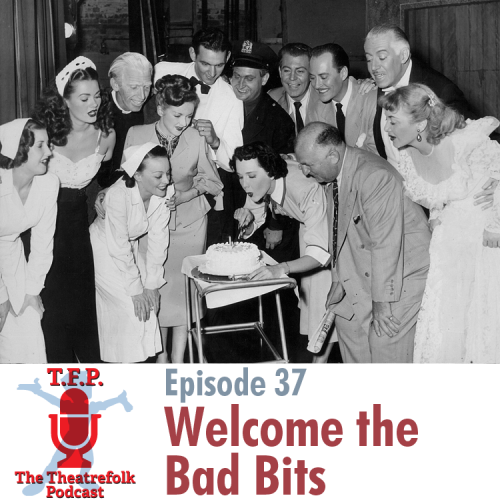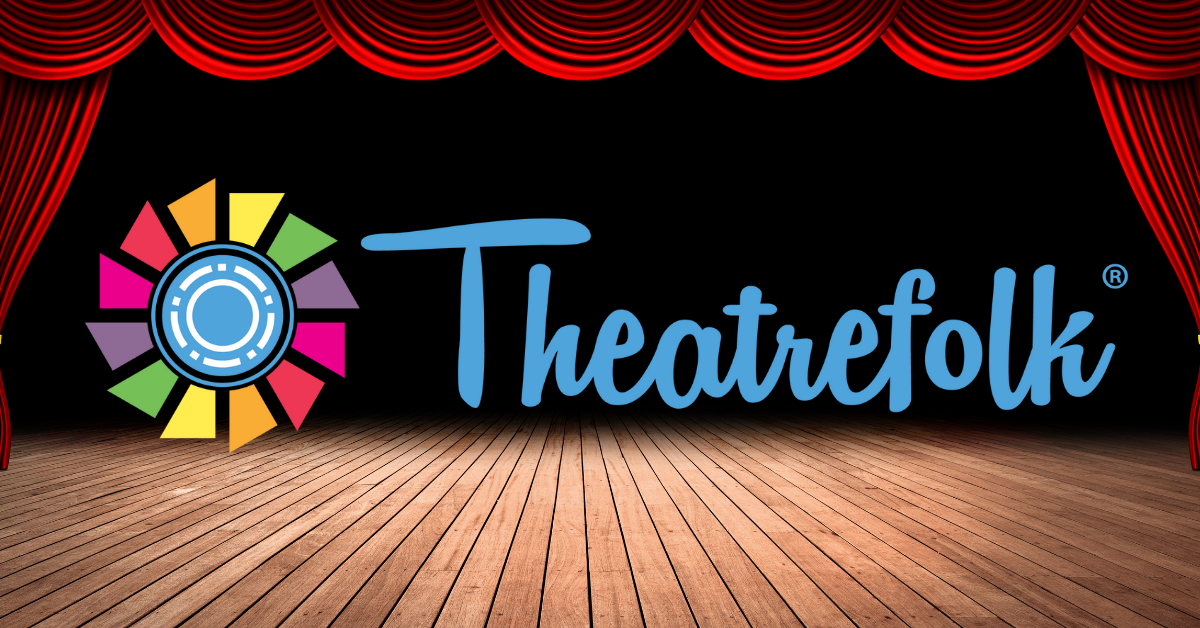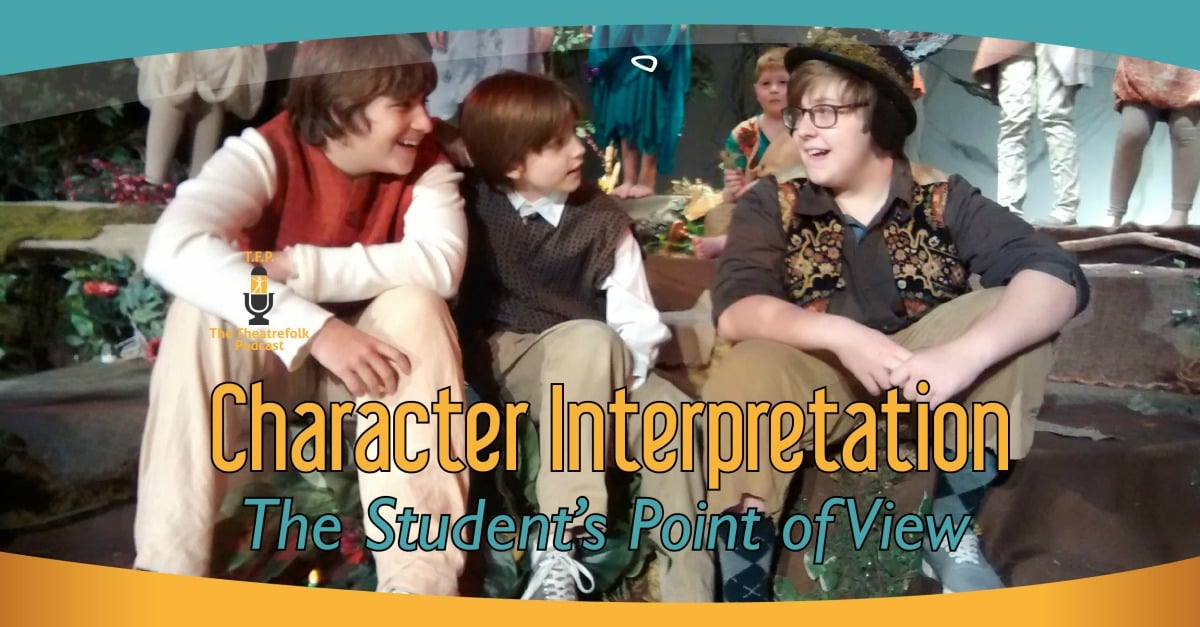Welcome the Bad Bits
Episode Thirty-Seven: Welcome the Bad Bits.
The path to success, whatever that success may be, is not by looking for the soft and easy road. Success comes when you accept the bad bits of your job, of your art. Nobody gets just the good bits.
Show Notes
- Royalty Exemptions for Scenes and Monologues for Competitions
- Competition Monologues: Book One
- Competition Monologues: Book Two
- Middle School Monologues: Guys
- Middle School Monologues: Girls
- Seth Godin on Just the Good Parts
Subscribe to The Theatrefolk Podcast
Episode Transcript
Welcome to TFP, the Theatrefolk podcast. I am Lindsay Price, resident playwright for Theatrefolk. Hello, I hope you’re well. Thanks for listening.
Today it’s all about the bad bits and I’m having such a fun time saying bad bits, bad bits, bad bits. Alliteration, love it. But first, let’s do some THEATREFOLK NEWS: A question that we often get is “I love such and such a monologue is it from a published play? I have to audition with a monologue from a published play does such and such count?” So I just want a lay off here all the monologues in our monologue collections which comprise of Competition Monologues, Competition Monologues Book 2, and Middle School Monologues for Girls and Middle School Monologues for Guys. Each of these books, and every monologue within each of these books, does indeed come from a published play. They come from our plays, imagine the surprise. And so each of these plays from which each of the monologues comes from can be found in the Theatrefolk catalogue or at our website www.theatrefolk.com. So worry no more monologue hunters, use ours in good health.
Lastly, where oh where can you find this podcast? We post new episodes every Wednesday at theatrefolk.com and on our Facebook page and Twitter. You can find us on the stitcher app, AND you can subscribe to TFP on iTunes. All you have to do is search on the word Theatrefolk.
Episode Thirty-Seven: Welcome the Bad Bits
Bas bits, bad bits, and bad bits – I’m so easily entertained. So this particular podcast was inspired from a blog post written by Seth Godin. Do you know who Seth Godin is? Let me share.
So Seth is known for being a marketer. Some call him a marketing guru. I’ll let you be the judge of that if you choose to search him out. He is also known for being an author and for selling those books in non-traditional ways. He’s big on the notion of failure as a path to success; talks about how ideas spread and that if you want your idea to spread, which is not through the dreaded viral concept. And let me say this if anyone announces “we want this to go viral,” they have no idea what that means because you can’t force viral and that idea will decidedly not go viral. If you want your idea to spread about how it has to be remarkable, such very big on the notion of shipping. Meaning, get your work out there.
Your work does you no good in your head. Writers, you writers, I’m talking to you. You need to not only get your work out of your head; you need to get it into the world. Ship your product. So I’m pretty big on a lot of what he does and what he says and I read his blog very regularly and I’m often struck by his posts. If you plunk Seth Godin (G-O-D-I-N) into Google, actually if you type in Seth’s Blog, his is the first that comes up.
So this particular post of his called: Just the Good Parts. I think you’ll see pretty clearly why it struck me and why it’s relevant to our particular world.
Just the Good Parts:
“I want to be an actress, but I don’t want to go on auditions.”
“I want to play varsity sports, but I need to be sure I’m going to make the team.”
“It’s important to sell this great new service, but I’m not willing to deal with rejection.”
You don’t get to just do the good parts. Of course, In fact, you probably wouldn’t have chosen this path if it was guaranteed to work every time.
The implication of this might surprise you, though: when the tough parts come along, the rejection and the slog and the unfair bad breaks, it makes sense to welcome them. Instead of cursing or fearing the down moments, understand that they mean you’ve chosen reality, not some unsustainable fantasy. It means that you’re doing worthwhile, difficult work, not merely amusing yourself.
The very thing you’re seeking only exists because of the whole. We can’t deny the difficult parts; we have no choice but to embrace them.
Love that. The very thing you’re seeking, which would be a success as an artist for those of us listening to this podcast, only exists because of the whole. And that whole is good and bad, that’s what it means to be an artist. I like that image; thinking of yourself as a whole being and not just scavenging after pieces, isn’t that what we want to be as humans trying to make our way in the world, three-dimensional whole? And if we are whole artists, what a fantastic way to live your life and that means, not just the good parts, but the bad bits. And frankly here’s the insider tip. That’s when true success comes when you’re not just scavenging for pieces, when you do accept the bad bits of your job along with the good and you deal with them and not running away from them.
And when I look back on my own artistic life, focusing on this image of being whole, when I was the most miserable was when I was scavenging after those pieces, when I say trying to attack. And when I say attack, I do mean bludgeon with the bluntest knife imaginable making a complete mess of everything. I was miserable when I was trying just to grab a piece of being a playwright. I was attacking the role. I was trying to be PLAYWRIGHT, ALL CAPS, in a way that would make me loved and adored always going for the good, wanting in always to be the good thing. When you always go after the good, when you’re trying to be unconditionally loved, when I would do that?
First of all it wasn’t universally loved. I failed time and time again and that was because I was not being true to myself as a writer. I was trying to be PLAYWRIGHT, ALL CAPS, right? And further, I would actually try to change my way of writing; change who I was as a writer just to get that love, to get the good. It wasn’t the playwright I wanted to be, I was just going after good parts. Whatever that means, only focusing on the good pieces which in the end, really was no good at all.
Trying to grab a piece of something, it’s just never going to be as satisfying as the whole. I didn’t, I never, you know I just wasn’t thinking about what it meant to be a whole artist. I had no idea. I was trying to be known, be popular, be loved, none of which has anything to do with the craft of writing. I had to ask myself some honest questions, that was my first step. What does being a playwright mean to me? Beyond this notion of love, what on earth am I writing and why? What kind of work do I want to write? What impact do I want to have?
And let me tell you, figuring out who I wanted to be… For real’s dawg, oh heavens! I am a white girl. Figuring out who I wanted to be, that made all the difference because knowing that meant I had a path, a road, I had my feet solidly on the ground and I had a direction. And the interesting thing is that when you know where you’re going, when good things do come your way, it’s a gazillion times more satisfying than just trying to grasp and grab because the good comes because of the path that you’re on. And when the bad things come your way as they must, if you’re trying to be a whole artist, again, it’s both. You can’t do one or the other. They’re easier to deal with because you’re still on the path. It’s easier to accept the bad bits because there is always the grounding of the road that I’m on. I have a journey and I have a purpose. Being grounded in that way, it is way harder for something bad to blow you off track.
So let’s talk about the bad bits and how important they are. We have to “welcome them” as Seth says. Welcome tough times, embrace the hard part of your job because that is when your job is sort of illuminated and becomes worthwhile. It gives your work value when it’s hard, when you work hard at something. If you’re not going to walk away when it’s hard, that means you’re committed. You’re prepared to do what it takes.
And frankly, but let’s be real about this whole notion of hard, right? Being an artist is not coal mining. The work that we’re doing, that we think is hard, it is not coal mining by any stretch of the imagination. The next time you want to whine about “It’s so hard, auditions. Oh it’s hard to write every day. It’s so hard.” Are you in a coal mine? Are you working in a factory? Are you working construction? Are you a nurse? Are you a teacher? Are you sitting in a cubicle day after day? Are you a parent? Look at the definition of the word hard, my friends and then give yourself a long look in the mirror to see if you are really, truly doing something that is classified, defined as hard.
Now lately, in the atmosphere, there is a lot of noise about how “young artists” those kids, men they don’t want those bad bits because they don’t want to do the work. They don’t want the hard part of being an artist. They only want the good. I want the parts but I don’t want to audition. I want to be published in five easy steps. Oh I have many conversations with young writers who ask “How do I get published?” and you can see in their eyes, what they really looking for is the map. How do I get from A to B in the least number of moves, right? If I do this, bingo, easy!
And this notion of the easy access seems to come up rather frequently about young actors mostly because of how reality TV has grown like a weed over the past ten years. There is this notion, because if it happens on TV, well it must be true that if one gets on a reality show, things materialize. Boom! You’re an actor. You have the easy access, the entrance through the door. Unfortunately, it can happen, it has happened once in a blue moon when someone crosses the divide from one to the other.
This notion, this has become the dream for many. I can go on American Idol and become a working musician. I can go on the Real World or Survivor or the Bachelor and become a working actor. And the problem with this notion, this plan, it’s right there in the middle, the nugget of the word dream it. I dream it and it just appears. There is a huge difference between having the dream of becoming an artist and having a vision of becoming the artist.
I certainly had a dream. I had an artistic dream when I was a teenager of becoming an actor on Broadway because then Broadway was this mythical place, this magical place. Wouldn’t it be awesome to be on Broadway? I love theatre and I would love to be on Broadway. I had this dream about it, what it would be like. You know what I did towards getting that dream? You know, going to that mythical place? Nothing, not a single thing; I didn’t learn to sing, I didn’t learn to dance, I didn’t move to New York. These are all steps that one can take towards this thing that is Broadway. It’s not mythical, magical thing right? You move to New York where actors work.
Time and time again I have conversations with young artists who say they have the dream and they have this idea of making a living as a writer or a dancer or an actor. And that’s it and that where it stops. They don’t really have a notion, not even the first step which is to go to the place where it actually happens. There is this idea that the dream’s going to come to them. And 9.999 times out of 10, it won’t. And so, it doesn’t happen.
That’s the different between dreams and visions. Dreams are ethereal, intangible. Visions involve a step by step process toward some things. Visions have a goal. Dreams have unicorns. Visions are realistic. They live in the real world, right? Involving real world actions; I want to be a TV actor, I’m going to move to LA. I want to be known as a comedy sketch artists, I’m going to go take The Second City classes in Chicago. I want to be a writer. Okay I want to get publish by this short story magazine. I’m going to finish 10 short stories so that I have a body of work. Visions have an end game and steps toward that end game.
Let’s say that your plan for being an actor involves the reality TV to stardom model. Let’s say that’s your dream. Okay, but take 5 minutes. The internet is a wonderful thing; it wouldn’t take you very long. And look at some of the folks who have been on, let’s say three reality shows. How many people have actually been on show blah to blah over the past five years? Reality TV has been around too long now. I don’t think; I do not believe there is this notion of “Oh I’ll just go and I’m going to find a husband. I’m going to on television and fall in love.” No, I do not believe that is the case anymore.
Everybody knows what happens on reality TV. These people want to be actors. They want to use it as a stepping stone. Okay, so take three shows. Take the people who have been on these shows. How many of them have actually parlayed reality TV into legitimate success, comparatively right? Take the actual number, you know the bachelor, we start with the 25 ladies, 25, 50, 100. How many of those have actually parlayed done into something? How many of them actually had steps? You know maybe get some training. How many of them are succeeding in the way that you want to succeed? And how many have just faded away, forgotten? What would you prevent that from happening to you, right? What happens if you are part of the mass where this dream does not come to you? Because you have that dream and the person next to you might have that dream and the person next to them might have that dream. It just doesn’t happen.
Now, when you have a purpose, when you have a vision, when you have steps that you can take towards that vision, when you have a grounding of a road, you’re moving forward. You’re taking action. It is so awesome to take action in your career, in your artistic life. You are actually responsible. You are taking steps. And when you do that, as I said, the good that comes is so wonderful and the bad that comes, well that’s not going to sway from your purpose, from your vision, from your road. And if it does, well, that is sort of a red flag. That is like a huge clue to you that you should go get another road. Go do something else. Because if bad is what crumbles you, then you better realize that bad is going to happen. Bad breaks are going to happen. Bad reviews will happen.
There is always something bad around the corner because that’s what happens in the real world because we don’t live in a dream world as much as we would like to, as much as we would love to hang out with unicorns. That’s not the way it works. We don’t live in a dream world. None of us do. So what are you going to do about it?
And that’s where we’re going to end. Take care, my friends. Take care.
Music credit: “Ave” by Alex (feat. Morusque) is licensed under a Creative Commons license.



